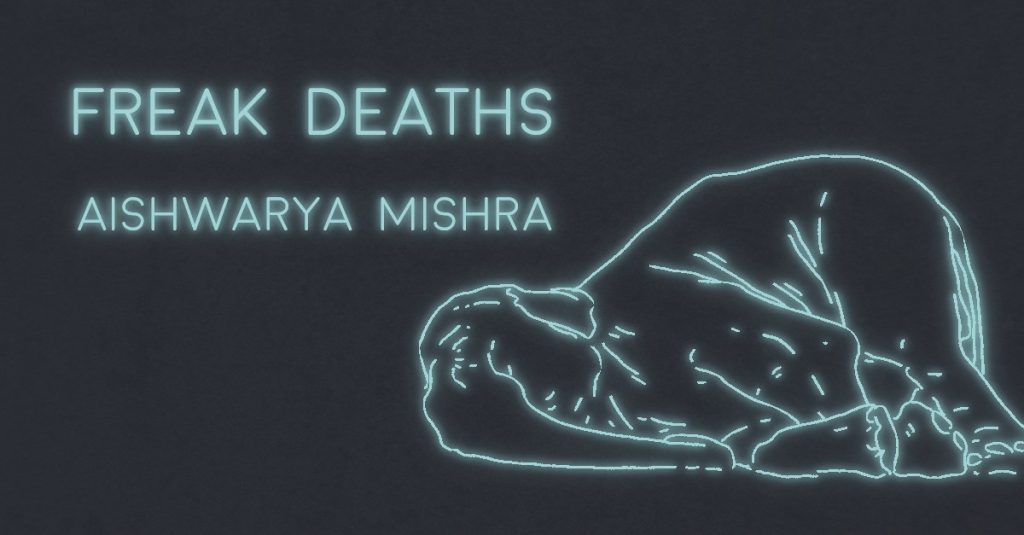Lasya transfers to our school in the peak of summer when the heat makes us more mirage than matter. Our mothers warn us against going out, but we want to see that translucence that makes us inquire after her surname.
“That house is Lord Krishna’s mouth,” our mothers say, “containing the entire universe within it.”
The air-conditioners are dismantled first. The first time we step inside their house, we find it throbbing like the angry vein we sometimes see on our fathers’ foreheads. Lasya’s Ma gives us watermelon juice to cool our stomachs and tells us of the family that went to sleep in the icy coldness of the air-conditioner which later became heat and debris and death.
We try not to look at their bruises. They are livid like their house.
Days later, the perfumes go too. Lasya smells of sandalwood-lemon-rose water as she tells us of a newly wedded wife who spritzed on something her husband liked and went into the kitchen. We cry for the husband, who will now love her forever, for no fault of his.
Our mothers mumble on the terrace as they lay out the pickles to dry.
“You cannot save your children from everything,” they say, their hands bright red from the pickle oils.
We think of Lasya’s bruise.
In the monsoons, we stare at the house until its stillness becomes bright green needles inside our heads. We hear of a man who got electrocuted in an ATM nearby. Our mothers shake their heads as they restock the refrigerators, even as we stick our fingers in the air, looking for sockets, for something a bright electric blue, like her bruise. We shudder at the mute violets and pinks that streak the skies. Our mothers tell us about lightning that strikes elsewhere. We see her looking at us from her room, the windows both her eyes and skin.
We think of that bare house, now swollen with the rains and anticipation, that lushness of nothing. We sleep to the thickening of crickets and want to ask her what drowns out the night in her house?
We have trouble sleeping. We wake up to the pricking absence of a knife, or to the moon-mothball hidden inside the clouds to keep the darkness fresh. We want to ask Lasya if this is her Ma’s doing.
In autumn, we meet Lasya and her banked fire of a bruise. It holds colours that the fall has never shown us. We shuffle leaves with our feet as she tells us the stairs are being removed in the house. Something about someone having broken their neck in another house.
These things happen, she says.
Our mothers tug at their sarees and wring the necks of banisters when we tell them.
These things happen, they say.
Winter brings with it bright rich soups and frenzied dancing. Lasya tells us the meaning of her name, and that she prefers Tandava, that dance of rage to Lasya, that dance of grace. We struggle to keep ourselves warm. She tells us her Ma read about the dancing plague that began with a girl like her. Bread can get fungi, fungi brings madness, she says quietly. We wonder at all the things that ferment. We wonder how we will live without bread or rice. We wonder at the rage that household grains can cause.
Ferment. Foment. We fail to grasp how something that relieves inflammation then becomes the cause of rage. Lasya tells us the story of a tyrant who catches fever. A blanket soaked in distilled spirits is sewn on to him. Then he dies once it catches fire. Do you choose the fever or the flames?, we want to ask her.
Next summer, the pregnant elephant dies first. We hear it from the villagers who come into town for the weekend markets. We stroke our stomachs as they tell us of her having ingested a pineapple filled with firecrackers and then having gone into the water to stand silently for three days as life fizzled out of her.
We who grew up on stories of mad elephants terrorizing entire villages do not understand this. We run to our mothers, who soothe us and nod silently. Do they understand this? We know rage as pineapples bursting with firecrackers; they know rage as the gently laughing ulcers in the womb. Is that what a child does to you?, we want to know.
Lasya’s Pa dies a few weeks later. Cardiac arrest, the doctor says. All of us, and our mothers, gather at the house. It is buzzing in a way that is almost disrespectful to death. We see new furniture, new utensils, new appliances. Our mothers smile softly at their presence. We stare silently at the absence of their bruises.

